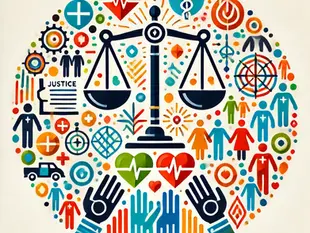The United Church of Christ (UCC) has long been a champion of justice and inclusion, affirming the dignity and worth of all people. A key part of this affirmation is upholding the principle of bodily autonomy, which recognizes each person's inherent right to make decisions about their own body without coercion or interference. This blog post will delve into why bodily autonomy is essential, particularly within the church context, and suggest practices that UCC congregations can implement to foster an environment of empowerment and respect.

Understanding Bodily Autonomy
Bodily autonomy means having the power and agency to make informed choices about one's own body. This includes decisions related to:
Reproductive Health: Access to comprehensive sexual and reproductive healthcare, including contraception, abortion, and fertility treatments.
Gender Identity and Expression: The freedom to express one's gender identity authentically, including access to gender-affirming healthcare.
Sexuality & Relationships: The right to explore and express one's sexuality in safe and consensual ways, regardless of sexual orientation or relationship structure.
Medical Decisions: The ability to make informed choices about medical treatments and procedures, including end-of-life care.
Physical Boundaries: Setting and enforcing personal space and physical touch, including protection from assault and harassment.
Why Bodily Autonomy Matters in the Church
Faith communities should be spaces where individuals feel safe, respected, and empowered. Upholding bodily autonomy is crucial for creating such an environment. Here's why:
Reflecting God's Image: The UCC affirms that all people are created in the image of God. Respecting bodily autonomy honors the divine within each person.
Promoting Human Dignity: Denying individuals control over their bodies undermines their inherent worth and dignity.
Fostering Trust and Safety: When people feel their autonomy is respected, they are more likely to trust their faith community and seek support when needed.
Living Out the Gospel: Jesus consistently challenged systems of oppression and affirmed the marginalized. Supporting bodily autonomy aligns with Jesus' ministry of justice and compassion.
Practices for Empowering Bodily Autonomy in UCC Congregations
Comprehensive Sex Education: Offer age-appropriate, comprehensive sex education that includes information about consent, healthy relationships, reproductive health, and LGBTQ+ identities.
Access to Resources: Provide information and resources on local healthcare providers, support groups, and advocacy organizations that promote bodily autonomy.
Inclusive Language: Use inclusive language that avoids gender or sexual orientation assumptions and affirms the diversity of human experiences.
Open Dialogue: Create safe spaces for open and honest conversations about sexuality, gender, and relationships, fostering an environment of learning and understanding.
Support for Survivors: Provide resources and support for survivors of sexual assault, domestic violence, and other forms of abuse, recognizing the violation of bodily autonomy inherent in these experiences.
Affirming LGBTQ+ Identities: Explicitly welcome and affirm LGBTQ+ individuals, celebrating their full participation in the life of the church.
Challenging Stigma: Actively challenge stigma and misinformation surrounding reproductive health, gender identity, and sexuality through education and advocacy.
Ethical Non-Monogamy: Recognize and respect the diverse ways people choose to structure their relationships, including ethical non-monogamy, as long as all involved are consenting adults.
Body Positivity: Promote body positivity and acceptance, challenging harmful beauty standards and celebrating the diversity of human bodies.
Empowerment through Consent: Emphasize the importance of consent in all interactions, teaching children and adults about boundaries and healthy communication.
Conclusion
By embracing these practices, UCC congregations can become beacons of hope and empowerment, fostering an environment where all individuals feel valued, respected, and free to make their own choices about their bodies. Upholding bodily autonomy is not only an act of justice but also a testament to the UCC's commitment to honoring the sacredness of every human being.
Thank you to Justice and Local Church Ministries of the United Church of Christ for the inspiration for this blog post. Please see their webinar, Nurture the Soul Special Offering: Healing the Body Politic(s) for a great discussion of this topic!



